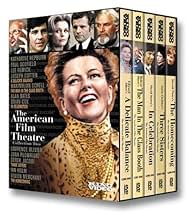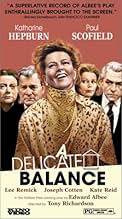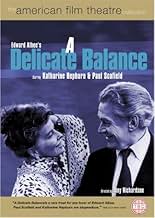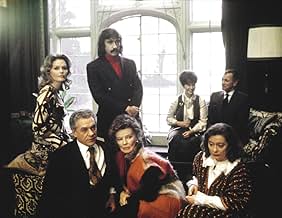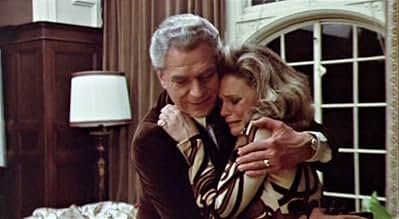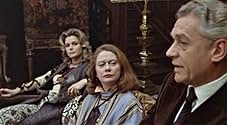AVALIAÇÃO DA IMDb
6,5/10
1 mil
SUA AVALIAÇÃO
Uma família próspera de Connecticut fica abalada quando os padrinhos da filha crescida, tomados por um terror sem nome, decidem morar com eles.Uma família próspera de Connecticut fica abalada quando os padrinhos da filha crescida, tomados por um terror sem nome, decidem morar com eles.Uma família próspera de Connecticut fica abalada quando os padrinhos da filha crescida, tomados por um terror sem nome, decidem morar com eles.
- Direção
- Roteiristas
- Artistas
- Prêmios
- 1 indicação no total
Avaliações em destaque
After seeing this I tried to figure out why it is considered at all above the ordinary. The characters are: a domineering wife, a docile husband, an alcoholic sister, a daughter working on her fourth divorce, friends in a crisis of anxiety. I suppose this exaggerated mix is interesting to a playwright, but maybe not to an audience, at least to this member of the audience. My interest flagged while spending over two hours watching these unhappy people work through their long-standing problems.
Katharine Hepburn as Agnes, the wife, is, well, Katharine Hepburn. That is good as far as it goes, but her performance here seemed overly rehearsed--every body movement and spoken line struck me as anything but spontaneous. If I had not known that it was Paul Schofield as Tobias, the husband, I would not have found his performance all that remarkable. Kate Reid's performance as Claire, Agnes' alcoholic sister, might play well on stage, but here it struck me as embarrassingly overacted, perhaps exaggerated by the extreme close-ups and silly script elements like the accordion playing. Lee Remick did add some spark as Julia, the much-divorced daughter. Betsy Blair, as Edna, a supposed friend, gave little indication why Agnes and Tobias should find her of value (not sure if this was a result of her performance or the script). Joseph Cotton, as Harry, Edna's husband, turned in the most sincere performance, making me think that he has been under-appreciated as an actor.
I liked the question raised of when love for friends equals, or even trumps, inherent family bonds. This play gives credence to Robert Frost's quote, "Home is the place, when you have to go there, they have to take you in," and submits that this quote is not as nearly a given when applied to friends.
I found some character behaviors unfathomable. Consider Julia's reaction to Harry and Edna's taking over her bedroom. She was insulted by this from the beginning, but about midway through the play she went ballistic and finally flew upstairs in a rage. Later Harry reported that Julia had become hysterical and was blocking a doorway with her arms outstretched. I fully expected that in subsequent scenes Julia would be carted off to the nut house, but no, the next morning she was calm and collected. When Harry and Edna came in to the house uninvited, with the intention of moving in, they appeared to be disconnected from reality. But then overnight they became rational.
Spending time with these people would be something that I would not look forward too, but neither did I want to spend two hours with them in this movie, being confined to a house with nothing to entertain but conversation. On the other hand, I would not want to spend time with George and Martha of, "Who's Afraid of Virginia Woolf" either, but I found that movie spellbinding.
Rather than the filming of a stage play, this movie is an adaptation. No matter how director Richardson tries to break up the monotony by mixing close-ups and two shots and using different vantage points for the camera, he cannot overcome the essential staginess, particularly given Albee's stricture that his text was not to be changed. I think that the filming of a stage production of this might have been preferable, since there is no pretense there of a realistic setting. It was a delicate balance for the family in this play to stay together but the movie fails to achieve the delicate balance of turning a stage play into an engrossing movie.
I think only those who appreciate stage productions will truly appreciate this movie.
Katharine Hepburn as Agnes, the wife, is, well, Katharine Hepburn. That is good as far as it goes, but her performance here seemed overly rehearsed--every body movement and spoken line struck me as anything but spontaneous. If I had not known that it was Paul Schofield as Tobias, the husband, I would not have found his performance all that remarkable. Kate Reid's performance as Claire, Agnes' alcoholic sister, might play well on stage, but here it struck me as embarrassingly overacted, perhaps exaggerated by the extreme close-ups and silly script elements like the accordion playing. Lee Remick did add some spark as Julia, the much-divorced daughter. Betsy Blair, as Edna, a supposed friend, gave little indication why Agnes and Tobias should find her of value (not sure if this was a result of her performance or the script). Joseph Cotton, as Harry, Edna's husband, turned in the most sincere performance, making me think that he has been under-appreciated as an actor.
I liked the question raised of when love for friends equals, or even trumps, inherent family bonds. This play gives credence to Robert Frost's quote, "Home is the place, when you have to go there, they have to take you in," and submits that this quote is not as nearly a given when applied to friends.
I found some character behaviors unfathomable. Consider Julia's reaction to Harry and Edna's taking over her bedroom. She was insulted by this from the beginning, but about midway through the play she went ballistic and finally flew upstairs in a rage. Later Harry reported that Julia had become hysterical and was blocking a doorway with her arms outstretched. I fully expected that in subsequent scenes Julia would be carted off to the nut house, but no, the next morning she was calm and collected. When Harry and Edna came in to the house uninvited, with the intention of moving in, they appeared to be disconnected from reality. But then overnight they became rational.
Spending time with these people would be something that I would not look forward too, but neither did I want to spend two hours with them in this movie, being confined to a house with nothing to entertain but conversation. On the other hand, I would not want to spend time with George and Martha of, "Who's Afraid of Virginia Woolf" either, but I found that movie spellbinding.
Rather than the filming of a stage play, this movie is an adaptation. No matter how director Richardson tries to break up the monotony by mixing close-ups and two shots and using different vantage points for the camera, he cannot overcome the essential staginess, particularly given Albee's stricture that his text was not to be changed. I think that the filming of a stage production of this might have been preferable, since there is no pretense there of a realistic setting. It was a delicate balance for the family in this play to stay together but the movie fails to achieve the delicate balance of turning a stage play into an engrossing movie.
I think only those who appreciate stage productions will truly appreciate this movie.
Fans of Edward Albee and Katharine Hepburn will find things to savor in this haphazard filming of the marvelous prize-winning play. But it's not always easy. Based on the slapdash direction, the piece looks as is the actors spent the requisite time rehearsing the play itself, and then the filming was done quickly and cheaply.
There are a series of generally long takes, but the staging looks more suitable for a proscenium stage than a film. And this is what separates a mediocre talent like Richardson from, say, Mike Nichols who did a far better job dealing with a (largely) confined space in the film of "Virginia Woolf." The result is that "Balance" comes off as stagy - a more inventive director could have avoided that without changing one line of the text.
"Balance" consists of a lot of mid-shots and close-ups, which doesn't serve all the actors well. This is particularly true of Kate Reid who plays the alcoholic sister Clare - Reid's performance might work well on stage, but with all her tight closeups during long speeches, she tends to overplay and make the character more gratingly tiresome than she should be.
The other casualty in the cast is Lee Remick, as the volatile, childish, much-married daughter of Hepburn and Scofield. But in her case it's Albee's writing that's the problem. This character is poorly conceived and developed - and no actress I know of has managed to make it palatable.
But Hepburn is in excellent form as the proud matriarch Agnes - perhaps a little more coarse at times than Albee intended, but very effective. Scofield as her passive-aggressive husband Tobias is marvelous until he mars his important penultimate scene with too many actorish vocal tricks.
Joseph Cotton and Betsy Blair as the old friends who come to Agnes and Tobias to escape the terror of collective loneliness are both good individually, but never seem to be a long-married couple.
Those not familiar with this play may be slightly turned off by the presentation and think the piece itself is second-rate. Not so. This film may be best for those who have seen it before or are familiar enough with Albee to take the film with a grain of salt and appreciate what's good about it.
There are a series of generally long takes, but the staging looks more suitable for a proscenium stage than a film. And this is what separates a mediocre talent like Richardson from, say, Mike Nichols who did a far better job dealing with a (largely) confined space in the film of "Virginia Woolf." The result is that "Balance" comes off as stagy - a more inventive director could have avoided that without changing one line of the text.
"Balance" consists of a lot of mid-shots and close-ups, which doesn't serve all the actors well. This is particularly true of Kate Reid who plays the alcoholic sister Clare - Reid's performance might work well on stage, but with all her tight closeups during long speeches, she tends to overplay and make the character more gratingly tiresome than she should be.
The other casualty in the cast is Lee Remick, as the volatile, childish, much-married daughter of Hepburn and Scofield. But in her case it's Albee's writing that's the problem. This character is poorly conceived and developed - and no actress I know of has managed to make it palatable.
But Hepburn is in excellent form as the proud matriarch Agnes - perhaps a little more coarse at times than Albee intended, but very effective. Scofield as her passive-aggressive husband Tobias is marvelous until he mars his important penultimate scene with too many actorish vocal tricks.
Joseph Cotton and Betsy Blair as the old friends who come to Agnes and Tobias to escape the terror of collective loneliness are both good individually, but never seem to be a long-married couple.
Those not familiar with this play may be slightly turned off by the presentation and think the piece itself is second-rate. Not so. This film may be best for those who have seen it before or are familiar enough with Albee to take the film with a grain of salt and appreciate what's good about it.
There is no music in this superb autumn melody. The words in the mouths of the characters are by Edward Albee and that is music enough. Katharine Hepburn plays Agatha, a close relative of the actress if I ever saw one, Paul Scofield is amazing playing the mild volcano of a husband promising eruptions that when they come they are so civilized that, irrigate rather than decimate. Kate Reid, took over from the extraordinary Kim Stanley and as sensational as Miss Reid is I can't help wondering what Stanley would have done with "a" alcoholic like Claire. Lee Remick is the perfect offspring for Hepburn and Scofield. Selfish, tenuous, childish, rich failure. Joseph Cotten and Betsy Blair are the catalysts, they and their fear, their plague coming to contaminate the contaminated. For film and stage gourmets this is an unmissable treat.
The film adaptation of 'A Delicate Balance' promises a good deal. Seeing Katharine Hepburn and Paul Scofield leading immediately attracted me, having loved them in other things. What has been seen of Tony Richardson, a lot more to see though, has been interesting. And the play is wonderful, the story is slight but the characterisation and drama are extremely rich. Again, while the characters are indeed unpleasant they are interesting in their flaws and none of it rings false. Neither do the eerily dysfunctional family dynamics.
So expectations were quite high, prior to watching 'A Delicate Balance' for those reasons. As well as loving the previous two films in the American Film Theatre series 'The Iceman Cometh' and 'The Homecoming'. Sadly, 'A Delicate Balance', while still being worth watching and above average, was a disappointment and was the start of when the series became inconsistent. Most of the following films in the series ranged between above average and good, while one was great and two were below average.
'A Delicate Balance' does have good things. The best thing about it is most of the cast, with Hepburn and Scofield being powerhouses in roles with a lot of meat to them. Especially Hepburn. Kate Reid's performance has gotten more mixed reviews here, count me in as one of those people that liked her here. She struck me as firey and intense in the role most difficult to pull off and near-impossible to nail. Joseph Cotten does understatement beautifully.
Moreover, a good deal of the photography is lovely on the eyes and elegant and the costumes and sets are nice. Edward Albee's dialogue still has wit, honesty and relevance. Parts are moving.
However, 'A Delicate Balance' also came over as very stagebound and can have a pedestrian pace. Despite some nice photography as mentioned, there is an over-reliance on claustrophobic close-ups that betrays the play's stage origins so it felt like a stage production being filmed fairly professionally. Richardson's direction has been more insightful and interesting in other films of his, it did too often come over as too clinical and not enough is done to open up the drama.
Lee Remick struggles badly in a very poorly written role, one of the very few issues that the play has, coming over as neurotic and unsure as to how to play it. Betsy Blair also overdoes it.
In summary, worth the look but could have been a lot better considering what it had going for it. 6/10.
So expectations were quite high, prior to watching 'A Delicate Balance' for those reasons. As well as loving the previous two films in the American Film Theatre series 'The Iceman Cometh' and 'The Homecoming'. Sadly, 'A Delicate Balance', while still being worth watching and above average, was a disappointment and was the start of when the series became inconsistent. Most of the following films in the series ranged between above average and good, while one was great and two were below average.
'A Delicate Balance' does have good things. The best thing about it is most of the cast, with Hepburn and Scofield being powerhouses in roles with a lot of meat to them. Especially Hepburn. Kate Reid's performance has gotten more mixed reviews here, count me in as one of those people that liked her here. She struck me as firey and intense in the role most difficult to pull off and near-impossible to nail. Joseph Cotten does understatement beautifully.
Moreover, a good deal of the photography is lovely on the eyes and elegant and the costumes and sets are nice. Edward Albee's dialogue still has wit, honesty and relevance. Parts are moving.
However, 'A Delicate Balance' also came over as very stagebound and can have a pedestrian pace. Despite some nice photography as mentioned, there is an over-reliance on claustrophobic close-ups that betrays the play's stage origins so it felt like a stage production being filmed fairly professionally. Richardson's direction has been more insightful and interesting in other films of his, it did too often come over as too clinical and not enough is done to open up the drama.
Lee Remick struggles badly in a very poorly written role, one of the very few issues that the play has, coming over as neurotic and unsure as to how to play it. Betsy Blair also overdoes it.
In summary, worth the look but could have been a lot better considering what it had going for it. 6/10.
Director Tony Richardson's presentation of "A Delicate Balance" could be dismissed for it's lack of edginess and it's gentrified (albeit screwed up) characters. It is also what critics would call a "stagy" film. Yet it is redeemed from this dour damnation because of Albee's wonderful way with words, the rich cinematography, and exceptional acting, exceptionally well cast: Katherine Hepburn, Paul Scofield, Lee Remick, Joseph Cotton.
For those looking for a violent film -- not in the form of bullets or explosions -- but of verbal surgical strikes, this is it. Edward Albee's dialogue provides all the female (yes, this would be considered a "woman's movie") protagonists and antagonists (one wonders at times which is which) a laser like aim against their primary targets: other women. And it is done under a guise of "civility"; sometimes, with a smile.
The stand-out among these veteran actors is Kate Reid, who plays Claire, the alcoholic in-law who at times gives the most voice to the story, set amid a dysfunctional Connecticut family. But even her performance can't out weigh the constant barrage of verbal cross-fire from her friends and in-laws. Yet the twist here is that the aggressors are the women, while the men attempt to keep the peace as best they can -- only firing back if attacked by the females.
This isn't a film for everyone; it's definitely the stuff of classic drawing room (psycho) drama. But for those who can appreciate consummate acting armed with deft dialogue, make yourself a nice cup of tea -- spiked with a shot or two of brandy -- and check this out.
For those looking for a violent film -- not in the form of bullets or explosions -- but of verbal surgical strikes, this is it. Edward Albee's dialogue provides all the female (yes, this would be considered a "woman's movie") protagonists and antagonists (one wonders at times which is which) a laser like aim against their primary targets: other women. And it is done under a guise of "civility"; sometimes, with a smile.
The stand-out among these veteran actors is Kate Reid, who plays Claire, the alcoholic in-law who at times gives the most voice to the story, set amid a dysfunctional Connecticut family. But even her performance can't out weigh the constant barrage of verbal cross-fire from her friends and in-laws. Yet the twist here is that the aggressors are the women, while the men attempt to keep the peace as best they can -- only firing back if attacked by the females.
This isn't a film for everyone; it's definitely the stuff of classic drawing room (psycho) drama. But for those who can appreciate consummate acting armed with deft dialogue, make yourself a nice cup of tea -- spiked with a shot or two of brandy -- and check this out.
Você sabia?
- CuriosidadesThis was the first (and only) time that Joseph Cotten and Katharine Hepburn appeared together since they starred in the original Broadway production of "The Philadelphia Story" in 1939.
- Citações
Agnes: Time! Time happens, I suppose, to people. Everything becomes... too late, finally. You know it's going on up on the hill; you can see the dust, and hear the cries, and the steel... but you wait, and time happens. When you do go, sword, shield... finally... there's nothing there... save rust, bones and the wind.
Principais escolhas
Faça login para avaliar e ver a lista de recomendações personalizadas
- How long is A Delicate Balance?Fornecido pela Alexa
Detalhes
- Data de lançamento
- Países de origem
- Idioma
- Também conhecido como
- Un equilibrio delicado
- Locações de filme
- Empresas de produção
- Consulte mais créditos da empresa na IMDbPro
- Tempo de duração
- 2 h 13 min(133 min)
- Mixagem de som
- Proporção
- 1.78 : 1
Contribua para esta página
Sugerir uma alteração ou adicionar conteúdo ausente


